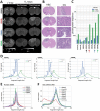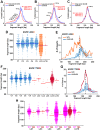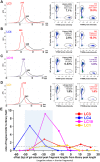Fragment Length of Circulating Tumor DNA
- PMID: 27428049
- PMCID: PMC4948782
- DOI: 10.1371/journal.pgen.1006162
Fragment Length of Circulating Tumor DNA
Abstract
Malignant tumors shed DNA into the circulation. The transient half-life of circulating tumor DNA (ctDNA) may afford the opportunity to diagnose, monitor recurrence, and evaluate response to therapy solely through a non-invasive blood draw. However, detecting ctDNA against the normally occurring background of cell-free DNA derived from healthy cells has proven challenging, particularly in non-metastatic solid tumors. In this study, distinct differences in fragment length size between ctDNAs and normal cell-free DNA are defined. Human ctDNA in rat plasma derived from human glioblastoma multiforme stem-like cells in the rat brain and human hepatocellular carcinoma in the rat flank were found to have a shorter principal fragment length than the background rat cell-free DNA (134-144 bp vs. 167 bp, respectively). Subsequently, a similar shift in the fragment length of ctDNA in humans with melanoma and lung cancer was identified compared to healthy controls. Comparison of fragment lengths from cell-free DNA between a melanoma patient and healthy controls found that the BRAF V600E mutant allele occurred more commonly at a shorter fragment length than the fragment length of the wild-type allele (132-145 bp vs. 165 bp, respectively). Moreover, size-selecting for shorter cell-free DNA fragment lengths substantially increased the EGFR T790M mutant allele frequency in human lung cancer. These findings provide compelling evidence that experimental or bioinformatic isolation of a specific subset of fragment lengths from cell-free DNA may improve detection of ctDNA.
Conflict of interest statement
The authors have declared that no competing interests exist.
Figures






References
Publication types
MeSH terms
Substances
Grants and funding
LinkOut - more resources
Full Text Sources
Other Literature Sources
Medical
Research Materials
Miscellaneous

